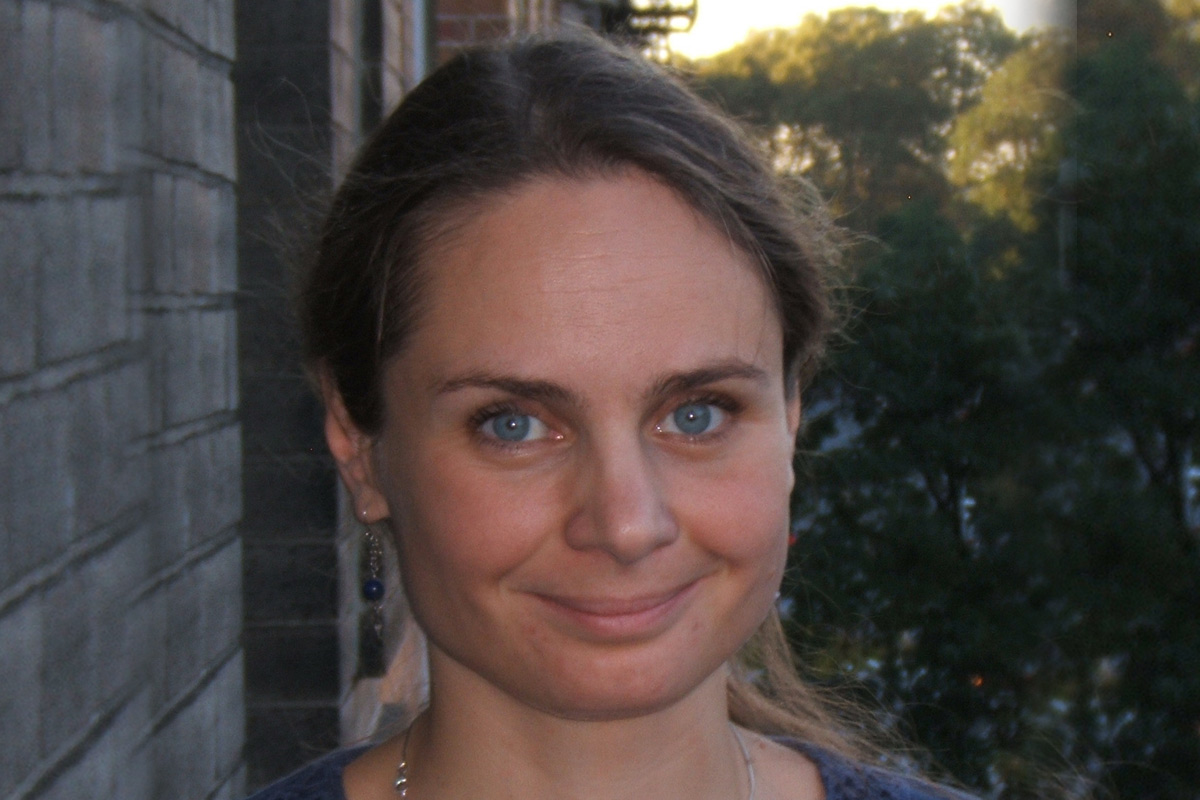Constructing the Bridge: Andrea Revesz
Searching for the bridge between theory and practice, Andrea Revesz began constructing her own path as her academic focus shifted from theoretical linguistics to applied linguistics and second language acquisition (SLA). Andrea, an alumna from the Applied Linguistics and TESOL program at Teachers College with a Doctor of Education in Applied Linguistics, fine-tuned the skills she needed to create this bridge during her studies in New York, learning not only through her professors and academic studies, but also through her classmates and collaborators.
Initially studying mathematics during college, Andrea switched to English and theoretical linguistics because it combined the scientific thinking of mathematics that she loved with her long-time passion for language. “Syntax was the reason I started doing theoretical linguistics when I stopped doing math. I was able to use the part of my brain again that was of a more scientific orientation.” An excellent high school English teacher also deepened her love for language, and, for her, linguistics was the perfect combination between language and scientific thinking.
In her native Hungary, Andrea attended university for 5 years and graduated with master’s degrees in theoretical linguistics and English linguistics and literature. Although she was already somewhat familiar with the education sector through various tutoring and language school teaching jobs, upon graduation, Andrea took a step further and began teaching in a state secondary school. It was then that she discovered her love for teaching. “I missed academic work and I thought, okay, I’d like to do a Ph.D. But I didn’t really want to do theoretical linguistics anymore because I got interested in teaching and thought I’d like to do something more applied.” The award her thesis won for her master’s was also a nudge in the direction of academia, giving her the confidence she needed to continue with both teaching and academics.
While pursuing her Ed.D. at TC, Andrea had to choose between the three program tracks of language use, language assessment, and second language acquisition (SLA). She decided on SLA, while pursuing a personal interest in assessment. “My supervisor was Professor Han. She’s a very knowledgeable person, so I’m very grateful to her. She’s very passionate about SLA, and she definitely handed down her passion to me. We also had a really good doctoral seminar. We were really close and a really supportive group. We’re still in touch; I work with them, publish with them, meet at conferences—-it’s lovely to see everyone.”
Andrea warmly recalls the impact Jim Purpura, whose own research is in assessment, had on her work, “I really appreciate that I still use many insights from his classes today. So I think my program was a great program in the sense that you don’t only learn about SLA, but also assessment and sociolinguistics. And for me, assessment was pretty important.”
Even after completing her doctorate, she continues to work to combine SLA and assessment, as she believes that each one complements the other. Language assessment helps to inform SLA, helping to more validly and reliably operationalize and measure outcomes in second language research. “I go to testing conferences, most of my funding comes from assessment projects, and compared to most SLA researchers, I have a pretty good understanding of assessment. I think that’s a really useful thing to have.”
Revesz’s academic trajectory has built up like blocks, beginning with her experiences at TC and ending where she is now at University College London (UCL). “When I was at TC, I was very fortunate in that I had the opportunity to teach an SLA course. I think that played an important role in securing my first job, a visiting assistant professor position at Georgetown University. This wasn’t a permanent or tenure track position, but it equipped me with much teaching experience and a lot of great research contacts for later. I think my experiences at TC and Georgetown helped a lot in securing my first permanent position at Lancaster University. Although I enjoyed studying and working in the States, my plan had always been to go back to Europe to be closer to family.”
Andrea loves her current job at UCL, which is part teaching, part research, part advising, part administration, but full passion. “Teaching is an important part of my job, but research and administration are just as important. We do a lot more than just teaching. Research probably takes up more of my time than teaching, depending on the time of the year.” She smiles as she reflects on her time at TC, saying “It was a great foundation for my work. I also made many friends at TC. It was an important experience both academically and at a personal level.”
Andrea treasures the time she spent at TC and has some advice for how current students can make the most of this experience. “To all the doctoral students, I think it’s a really great idea to go to conferences. It’s very motivating, you meet a lot of people, and you realize that your research is relevant and interesting to others as well. There are other people out there who share the same passion.” Collaboration is also key to Andrea’s development as a researcher and educator. Although bridging the gap between theory and practice is never easy, Andrea’s passion and commitment to intellectual inquiry, diving into the big questions of SLA, and equipping better informed and more reflective teachers show that it is possible. She doesn’t just seek to identify this bridge; she leads the way in walking across it.
